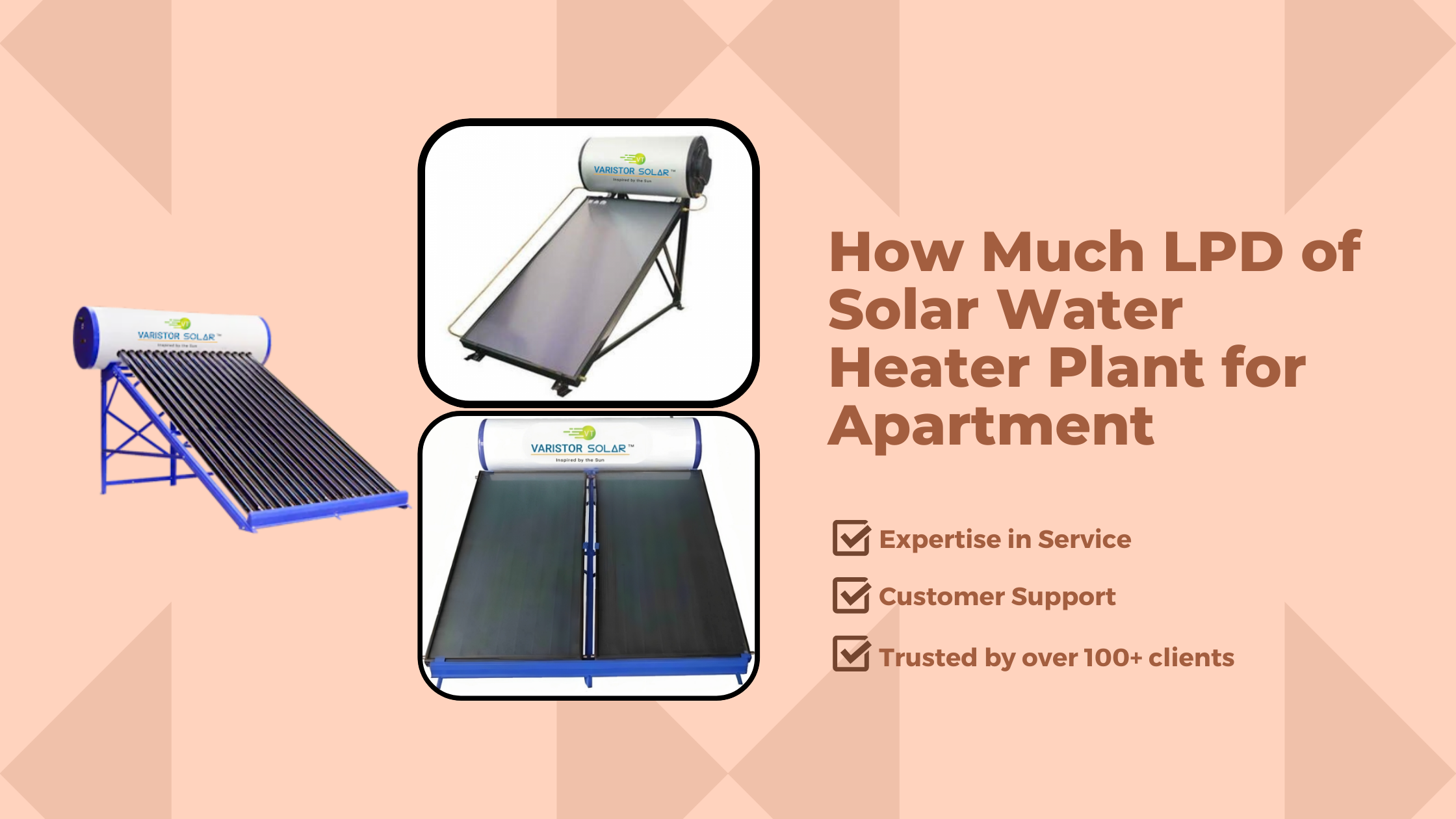
Varistor Solar is dedicated to empowering individuals, businesses, and communities with the transformative power of solar energy. We believe in a brighter, cleaner future and are committed to making sustainable living accessible to everyone.
+91-9113690456
Email: sales@varistorsolar.com
Varistor Solar
NO 40/C, KALKERE VILLAGE,12TH MAIN, NRI LAYOUT,Ramamurthy Nagar, Bangalore North,Bangalore- Karnataka, 560016
Introduction
Solar water heaters have become an essential addition to modern apartments, providing an eco-friendly and cost-effective solution for hot water needs. With increasing awareness of environmental sustainability, more people are turning to solar water heaters. But how much LPD (liters per day) of a solar water heater plant is ideal for an apartment? This beginner's guide will walk you through everything you need to know.

Understanding Solar Water Heaters
What is a Solar Water Heater?
A solar water heater is a system that uses solar energy to heat water. It consists of solar collectors, a storage tank, and a system to circulate the water. Solar water heaters can be used in various settings, including PGs (paying guest accommodations), hospitals, guest houses, and apartments.
How Does a Solar Water Heater Work?
Solar water heaters work by absorbing sunlight through solar collectors, usually mounted on the roof. The heat is then transferred to the water stored in a tank, providing hot water for various uses. The system can significantly reduce electricity or gas bills, making it a popular choice in India and around the world.
Factors to Consider for LPD in Apartments
Number of Occupants
The number of occupants in an apartment is a crucial factor in determining the LPD of a solar water heater. Generally, each person requires about 50 liters of hot water per day. For example, a family of four would need a 200 LPD solar water heater.
Usage Patterns
Consider how often and for what purposes hot water is used in the apartment. Frequent usage for showers, washing dishes, and laundry will require a higher LPD system.
Climate and Sunlight Availability
The efficiency of a solar water heater depends on the amount of sunlight available. In areas with less sunlight, you may need a larger system to meet your hot water needs.
Space Availability
The space available for installing the solar collectors on the roof or other suitable locations will also influence the choice of the LPD system.
Choosing the Right LPD for Your Apartment
Assessing Your Needs
Start by assessing your hot water needs. Consider the number of occupants and their daily hot water usage. For a typical apartment with 2-3 occupants, a 100-150 LPD system may suffice. For larger families, a 200-300 LPD system would be more appropriate.
Comparing Different Systems
Different solar water heater systems come with various capacities and features. Compare the solar water heater rate, efficiency, and durability. Companies like Varistor Solar offer a range of options to suit different needs and budgets.
Consulting Professionals
Consulting with professionals can provide valuable insights into selecting the right LPD system. They can assess your specific needs and recommend the best system, taking into account factors like climate, roof space, and budget.
Installation and Maintenance
Installation Process
The installation process involves mounting the solar collectors, connecting the storage tank, and setting up the circulation system. Professional installation ensures optimal performance and longevity of the system.
Maintenance Tips
Regular maintenance is essential for the efficient functioning of the solar water heater. Cleaning the solar collectors, checking for leaks, and ensuring proper insulation can help maintain the system's efficiency.
Benefits of Solar Water Heaters in Apartments
Cost Savings
Investing in a solar water heater can lead to significant cost savings on electricity or gas bills. The initial investment is usually recovered within a few years through reduced energy costs.
Environmental Impact
Solar water heaters reduce reliance on fossil fuels, contributing to lower carbon emissions and a smaller environmental footprint. They are a sustainable choice for environmentally conscious individuals and communities.
Government Incentives
In many regions, including India, government incentives and subsidies are available for installing solar water heaters. These incentives can further reduce the overall cost and make solar water heaters an attractive investment.
Solar Water Heater PG
PG accommodations often require efficient hot water systems for multiple occupants. A solar water heater PG setup can cater to the needs of several residents, providing an eco-friendly and cost-effective solution.
Solar Water Heater in Apartment
Solar water heaters in apartments offer a sustainable way to meet hot water needs. They are ideal for urban settings where space and energy efficiency are crucial.
Solar Water Heater in Hospital
Hospitals require a continuous supply of hot water for various medical and hygiene purposes. Solar water heaters can provide a reliable and sustainable solution for healthcare facilities.
Solar Water Heater in Guest House
Guest houses benefit from solar water heaters by offering guests a comfortable stay while reducing energy costs. It enhances the guest experience and promotes environmental responsibility.
Solar Water Heater
The general term "solar water heater" encompasses various applications, including residential, commercial, and industrial uses. It highlights the versatility and widespread adoption of this technology.
Comparing Prices and Options
Solar Water Heater 200 Litre Price
The price of a 200-liter solar water heater varies depending on the brand, features, and location. On average, it ranges from INR 20,000 to INR 35,000. Comparing different options and brands can help you find the best deal.
Solar Water Heater Rate
The rate of solar water heaters depends on factors like capacity, efficiency, and brand reputation. It's essential to consider long-term savings and benefits when evaluating the cost.
Solar Water Heater System
A complete solar water heater system includes collectors, storage tanks, and circulation components. Investing in a high-quality system ensures better performance and durability.
Regional Considerations
Solar Water Heater in Bangalore Price
Bangalore, with its moderate climate and ample sunlight, is an ideal location for solar water heaters. Prices in Bangalore may vary, but the investment is worthwhile considering the long-term benefits.
Solar Water Heater Jaipur
Jaipur's sunny climate makes it an excellent candidate for solar water heaters. Local suppliers and government incentives can make the installation more affordable.
Solar Water Heater in India
India's diverse climate and increasing energy demands make solar water heaters a practical solution. Government policies and growing awareness are driving the adoption of solar water heaters across the country.
Top 10 Solar Water Heater Companies in India
When choosing a solar water heater, it's essential to consider reputable brands. Here are the top 10 solar water heater companies in India:
- Varistor Solar
- Tata Power Solar
- V-Guard
- Racold
- Supreme Solar
- Emmvee Solar
- Havells
- A.O. Smith
- Bosch
- Bajaj
These companies offer a range of products catering to different needs and budgets, ensuring quality and reliability.
Conclusion
Selecting the right LPD of a solar water heater plant for an apartment involves understanding your hot water needs, comparing different systems, and considering factors like climate and space availability. With the right system, you can enjoy significant cost savings, environmental benefits, and a sustainable solution for your hot water needs. Varistor Solar offers a range of options to help you find the perfect solar water heater for your apartment.
FAQs
- How much LPD is required for a 4-person apartment?
- Typically, a 4-person apartment would require a 200 LPD solar water heater.
- What are the benefits of using a solar water heater in an apartment?
- Benefits include cost savings on energy bills, reduced environmental impact, and potential government incentives.
- How often should a solar water heater be maintained?
- Regular maintenance should be performed at least once a year to ensure optimal performance.
- Can a solar water heater work on cloudy days?
- Yes, most solar water heaters can still function on cloudy days, although their efficiency may be reduced.
- What is the average lifespan of a solar water heater?
- A well-maintained solar water heater can last between 15 to 20 years.
Why Varistor Solar water heater?
Wonder, how much will you save?
Luxurious bath with 24x7* hot water
Enjoy a luxurious bathing experience with a constant supply of hot water, available 24x7.
Our advanced systems ensure instant hot water at any time of the day or night, making your daily routine comfortable and convenient.
Safe & Secure
Solar water heaters are accident and hazard-free compared to electric, gas heaters, and firewood boilers.
They provide a safe and reliable source of hot water, reducing the risk of burns and other hazards associated with traditional heating methods.
Innovative technology & uncompromised quality
Continuously striving to bring out more innovative and cost-beneficial products.
Trustworthy
Rich and prolific experience in solar energy technology of about three decades. A strong legacy of trust and transparency.
Expertise in Service
We provide genuine spares and services with the help of expert dealers and dedicated customer care unit.
Now It's Your Turn:
Making the switch to solar water heaters in Delhi is a smart and sustainable choice. The top brands like Varistor Solar™, Racold, Havells, V-Guard, and AO Smith offer reliable options to meet your hot water needs efficiently.
Among these, Varistor Solar™ stands out as the top choice in India, trusted by many. We provide a variety of solar water heaters, catering to different preferences and requirements. Our clients trust us for our quality and performance.
For more details about our solar water heaters, call us at 9113690456 or email sales@varistorsolar.com. Choose Varistor Solar™ for a greener and more energy-efficient future.
"WHAT YOU CAN READ NEXT"
 Read more +03 September 2024 in Solar Water Heater
Read more +03 September 2024 in Solar Water HeaterWhich is the Best Solar Heater Brand in Yeshwanthpura, Bengaluru
 Read more +03 September 2024 in Solar Water Heater
Read more +03 September 2024 in Solar Water HeaterWhich is the Best Solar Heater Brand in Yelchenahalli, Bengaluru
 Read more +03 September 2024 in Solar Water Heater
Read more +03 September 2024 in Solar Water Heater




